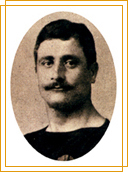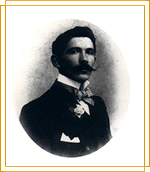March 29th 1896: 5th day of the events
From early in the morning the crowd was unusually restless and excited because this was the day of the Marathon, the long-awaited event ever since the organization of the Games has been proposed.  Ever since Athens has undertaken the organization of the Games everybody wished for a Greek winner at the Marathon race. As a result, many promises and prizes were announced. Hotel owners, tailors, hairdressers and other merchants announced to the press that if a Greek was the winner of the Marathon they would offer him their services free of charge, some of them for life and others for a specific period of time, whereas others offered to give the winner prizes and gifts. Ever since Athens has undertaken the organization of the Games everybody wished for a Greek winner at the Marathon race. As a result, many promises and prizes were announced. Hotel owners, tailors, hairdressers and other merchants announced to the press that if a Greek was the winner of the Marathon they would offer him their services free of charge, some of them for life and others for a specific period of time, whereas others offered to give the winner prizes and gifts.
It is estimated that there were approximately 70,000 people at the Panathenaic Stadium that day.
Parallel Bars
Eighteen athletes took part in this event and Alfred Flatow, a German gymnast, was the winner.
Climbing the rope
Five athletes took part in this spectacular and demanding event that required the athletes to climb on a 14m rope which was fastened on a pole. The Greek athlete Nikolaos Andriakopoulos, of the Panachaean Club, was the winner since he climbed with enviable art and rapidity.
Shooting
The winner of the 25m shooting event with a revolver was the American infantry lieutenant John Paine, who competed using his own gun, whereas his brother Summer Paine came in second.
100m race (final)
Six athletes participated and Thomas Burke, the American athlete, was the winner.
High Jump
The contestants had to jump above a horizontal bar without knocking it down. The lowest height the athletes should jump was 1.50 m. One after the other the athletes were eliminated and Ellery Clark, the American athlete, was the winner with a jump at 1,81m.
110m. hurdle-race
The event turned into a personal race between Thomas Curtis, the American athlete and Grantley Goulding, the English athlete. Finally the former was the winner.
Pole vault
The spectators watched intently this event since it was interesting and spectacular. Towards the end the contest was interrupted as the Marathon runners arrived in the Stadium and it continued later on. William Hoyt, the American was the winner.
The Marathon
The best runners of the foreign athletes that had excelled in the other events signed in for the Marathon, like the American Edwin Flack, the French Albin Lermusiaux,  the American Arthur Blake, as well as various Greek athletes that were distinguished in the Panhellenic Games. the American Arthur Blake, as well as various Greek athletes that were distinguished in the Panhellenic Games.
However, most of the numerous athletes who had signed up for the event withdrew at the last minute feeling that they did not have the strength to compete. The rest of the athletes, around twenty-five in number, went to Marathon together with the special committee from the previous day. The race started at around 14.00. During the race many people from the villages in Attica stood along the road and waited for the competitors. Then they encouraged them, with no discrimination of nationality and offered them refreshments. When they passed Pikermi, many started to be overwhelmed by tiredness and retired to the carriages that followed them. Louis, from Maroussi, passing an inn near Pikermi, asked for and drank a glass of wine. When at the 33rd kilometer he caught up with the American Flack, the other favourite of the race, his victory was assured.
Meanwhile the crowd in the Stadium awaited anxiously. Finally, a sweaty, suntanned man dressed in white entered the Stadium. It was Louis, the winner of the Marathon race. As he run towards the finishing line, the heir to the throne and prince George started running by his side.
What followed is beyond description. The enthusiastic crowd celebrated wildly his victory screaming as loud as possible while the bands played the national anthem.
Charilaos Vasilakis came in second.
Wrestling
Five athletes took part in this event: the Greeks Stefanos Christopoulos and Georgios Tsitas, the Hungarian Momcilo Tapowicza, the English Launceston Elliot and the German Carl Schuhmann. As night approached they postponed the event for the following day.
Celebrating at Piraeus
This historic day, so filled with emotions, came to an end with a great celebration at Piraeus: many lights, music, a procession and fireworks created a celebration that lasted till midnight.
|
